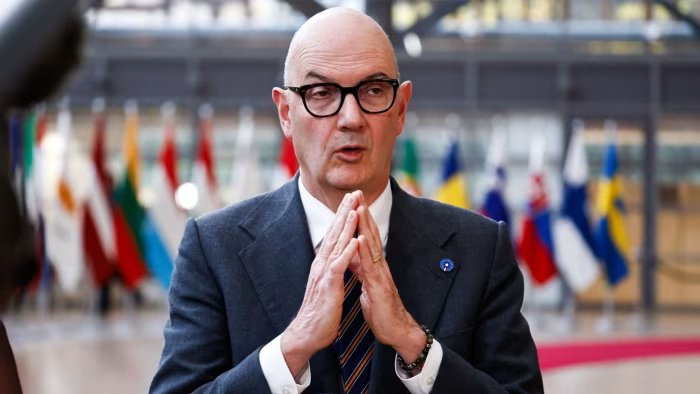Good morning. A scoop to start: Brussels has called for an EU-wide handling fee on small packages ordered online from platforms such as Shein, Temu and Alibaba to be imposed from early 2026, more than two years earlier than planned, in a drive to crack down on cheap Chinese imports.
Here, our finance correspondent previews a meeting of EU finance ministers this morning that will seek to move forward a stymied plan for a €140bn reparations loan for Ukraine backed by immobilised Russian assets, and our Dublin correspondent reports on the latest plan to solve Ireland’s housing crisis.
Arguing about assets
EU finance ministers will today tackle how to fund Ukraine from next year, with the European Commission hoping to rally support for a loan using Russian state assets frozen in the bloc, writes Paola Tamma.
Context: EU leaders last month demanded that the commission present financing options “as soon as possible” after Belgium refused to back a €140bn reparations loan for Ukraine, which would use cash balances arising from Russian state assets blocked at the central security depository Euroclear in Brussels.
The commission is still working on those options, but a draft document seen by the FT last week clearly points to the reparations loan as the best — and cheapest — alternative.
Joint debt, mentioned as another option, would carry interest costs for member states of up to €5.6bn a year, states the draft. Bilateral grants, the third suggestion, would require EU countries to disburse cash to Kyiv worth up to 0.27 per cent of their GDP per year. Both those options are extremely unpopular at a time when countries are tightening their purse strings.
Last Friday, the Belgian government and Euroclear met the commission but there was no breakthrough, as Belgium still feels it has not been given sufficient clarity over measures to share the risks from the loan.
One of the requirements is for EU countries to cover Euroclear’s exposure with bilateral guarantees, but it’s unlikely that all EU countries would participate, with Hungary and Slovakia already counting themselves out.
Former Nato secretary-general Jens Stoltenberg, now Norway’s finance minister, said Oslo was open to considering participating in guaranteeing the loan.
Other unresolved issues relate to how long litigation risks should be mutualised, for instance if Russia sues Euroclear outside the EU and is awarded compensation. Belgium and the commission are in talks about the issue, as other countries won’t accept handing over a blank cheque to cover exposure, but Belgium won’t accept vague terms.
Another open question is whether Russian assets immobilised in other EU countries such as France could be tapped.
Yet the expectation seems to be that Belgium will be convinced.
“This option seems to us today to be technically feasible, legally desirable, and politically sound,” French finance minister Roland Lescure said yesterday about the loan. “It’s a good option that we must explore and move forward with quickly.”
Lars Klingbeil, his German counterpart, said he was “optimistic that this can succeed”.
Chart du jour: All aboard
A new wave of cruise-goers has emerged since the Covid-19 pandemic, lured by cheaper prices, comprehensive amenities and convenience.
Fourth time’s a charm?
Ireland’s Taoiseach Micheál Martin is confident that a new housing plan, to be published today, will finally fix Ireland’s housing problem — succeeding where three others in the past dozen years have failed, writes Jude Webber.
Context: Ireland is among several EU countries battling a housing shortage. Its insufficient housing supply is pushing up purchase and rental prices and has sparked record homelessness. According to a new report by property site Daft.ie, rents in Ireland are now a third higher than before the Covid-19 pandemic.
The long-promised new blueprint, known as “Delivering Homes, Building Communities”, follows in the footsteps of previous plans from 2021, 2016 and 2014. It will set a goal to build 90,000 starter homes by 2030, as well as an average of 12,000 social homes and 15,000 affordable homes a year.
Martin has hailed the plan as the “most unprecedented investment in housing ever” and says it will succeed where others have failed.
Cynics may scorn another set of targets given the government touted 40,000 new homes last year but only managed just over 30,000. Meanwhile, more than 16,600 people are homeless, including more than 5,200 children.
Still, home completions increased 13 per cent in the first nine months of this year compared to the same period in 2024. Martin says hitting the new goals will be “challenging . . . but we simply have to do it”.
What to watch today
-
EU finance ministers meet in Brussels.
-
Italy’s Prime Minister Giorgia Meloni hosts her Albanian counterpart Edi Rama in Rome.
Now read these
Are you enjoying Europe Express? Sign up here to have it delivered straight to your inbox every workday at 7am CET and on Saturdays at noon CET. Do tell us what you think, we love to hear from you: europe.express@ft.com. Keep up with the latest European stories @FT Europe


